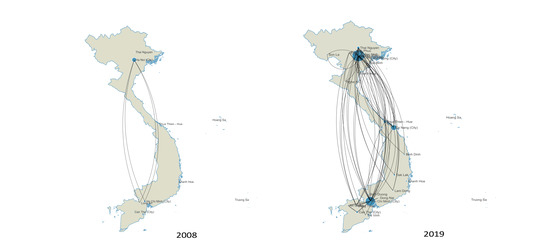The Internal Capability of Vietnam Social Sciences and Humanities: A Perspective from the 2008–2019 Dataset
Abstract
1. Introduction
2. Literature Review
2.1. Lead Authors, New Authors, Solo Authors and Female Authors in Vietnam’s SSH
2.2. Collaboration Patterns of Authors in Vietnam’s SSH
3. Materials and Methods
3.1. Materials
- Being affiliated with an organization in Vietnam; OR
- Publishing at least one paper about Vietnam or using data collected in Vietnam-related research in SSH disciplines.
- The SSHPA database takes into account both international and domestic perspectives on scientometrics, and the database strives to be as expansive as possible.
- For this research, the data collection process includes three steps: searching for authors, updating their profile, and assuring data quality.
- Step 1: searching for authors. Collecting information about Vietnamese social scientists who have international publications on reliable mainstream sources and cross-validating among data sources. Experts’ opinions are consulted for suggestions and confirmation of new researchers.
- Step 2: updating their profile. After the data are gathered and cross-checked to ensure reliability, author information is entered into SSHPA’s system.
- Step 3: assuring data quality. We check the data both manually and automatically. The data collectors check the accuracy of the information with different sources. Also, the SSHPA system can filter out duplicate and suspicious data automatically.
- More details about the data collection process are illustrated in the article by Vuong et al. (2018) [29].
3.2. Variables
- Author: the person who published the paper recorded into the SSHPA system. Author information includes general information (SSHPA ID, full name, year of birth, sex, nationality, Scopus Author ID), contact information, affiliation, and articles. In this article, sometimes the term ‘Researcher’ is used with the same meaning as ‘Author’.
- ◯
- Lead author: The first author of a paper.
- ◯
- “New” author: Those who are recorded to have a publication for the first time in the SSHPA database.
- Publication: includes journal articles, books, book chapters, and conference proceedings in the NAFOSTED list mentioned above. During the data entry process, each publication is assigned to a certain field. Interdisciplinary publications can be assigned to more than one field.
- ◯
- Vietnamese authored publications: publications whose authors are all Vietnamese.
- ◯
- Internationally collaborated publications: publications that have a least one author whose nationality is not Vietnamese.
- Affiliation: the author’s workplace, as stated in the publication.
- JIF: The impact factor level of the journal in which the articles were published. This varies from year to year.
- The number of Vietnamese and foreign lead authors,
- The number of Vietnamese authored publications and internationally collaborated publications,
- The collaboration network of domestic institutes,
- The number of affiliations and articles in domestic research collaboration,
- The number of Vietnamese researchers by gender, including the number of all authors, the number of “new" authors, the number of lead authors, and the number of solo authors.
4. Results
4.1. The Scientific Output of Authors in Vietnam’s SSH in Terms of Lead Authors and Gender Differences
4.2. Research Collaboration Patterns of Authors in Vietnamese SSH
5. Discussion
5.1. Lead Authors, Solo Authors and Female Authors in Vietnam’s SSH
5.2. Research Collaboration Patterns of Authors in Vietnam’s SSH
6. Limitations
Supplementary Materials
Author Contributions
Funding
Conflicts of Interest
References
- Vuong, Q.-H.; Napier, N.K.; Ho, T.M.; Nguyen, V.H.; Vuong, T.-T.; Pham, H.H.; Nguyen, H.K.T. Effects of work environment and collaboration on research productivity in Vietnamese social sciences: Evidence from 2008 to 2017 scopus data. Stud. High. Educ. 2019, 44, 2132–2147. [Google Scholar] [CrossRef]
- Jonathan, A.; David, P.; Gordon, R.; Szomszor, M. Global Research Report—South and East Asia; Institute for Scientific Information: Philadelphia, PA, USA, 2019. [Google Scholar]
- Nguyen, V.T. Năng suất khoa học Việt Nam qua công bố quốc tế 2001–2015—[Scientific Productivity of Vietnam Through International Publications 2001–2015]. Tap Chi Khoa Hoc Cong Nghe Viet Nam 2006, 10, 49–54. [Google Scholar]
- Manh, H.D. Scientific publications in Vietnam as seen from Scopus during 1996–2013. Scientometrics 2015, 105, 83–95. [Google Scholar] [CrossRef]
- Nguyen, T.V.; Ho-Le, T.P.; Le, U.V. International collaboration in scientific research in Vietnam: An analysis of patterns and impact. Scientometrics 2017, 110, 1035–1051. [Google Scholar] [CrossRef]
- Ho, T.M.; Nguyen, H.V.; Vuong, T.-T.; Dam, Q.-M.; Pham, H.-H.; Vuong, Q.-H. Exploring Vietnamese co-authorship patterns in social sciences with basic network measures of 2008–2017 Scopus data. F1000Research 2017, 6, 1559. [Google Scholar] [CrossRef] [PubMed]
- Hien, P.D. A comparative study of research capabilities of East Asian countries and implications for Vietnam. High. Educ. 2010, 60, 615–625. [Google Scholar] [CrossRef]
- Nguyen, T.V.; Pham, L.T. Scientific output and its relationship to knowledge economy: An analysis of ASEAN countries. Scientometrics 2011, 89, 107–117. [Google Scholar] [CrossRef]
- Yi, Y.; Qi, W.; Wu, D. Are CIVETS the next BRICs? A comparative analysis from scientometrics perspective. Scientometrics 2013, 94, 615–628. [Google Scholar] [CrossRef]
- Hoang, V.Q.; Dung, T.T.; Napier, N.K.; Ha, D.T. Business Education in the Emerging Economy of Vietnam: Twenty Years of Expectations, Illusions and Lessons. In Innovation in Business Education in Emerging Markets; Alon, I., Jones, V., McIntyre, J.R., Eds.; Palgrave Macmillan: London, UK, 2013; pp. 96–109. [Google Scholar] [CrossRef]
- School Curriculum and Standards Authority. Humanities and Social Sciences; School Curriculum and Standards Authority, Ed.; School Curriculum and Standards Authority: Cannington, WA, Australia, 2017. [Google Scholar]
- Nowotny, N. Social sciences and humanities for a global world. In Thinking Ahead: Research, Funding and the Future; Björkman, J., Fjæstad, B., Eds.; Makadam Press: Stockholm, Sweden, 2015; pp. 225–235. [Google Scholar]
- Dyachenko, E.L. Internationalization of academic journals: Is there still a gap between social and natural sciences? Scientometrics 2014, 101, 241–255. [Google Scholar] [CrossRef]
- Vuong, Q.-H.; Ho, T.M.; Vuong, T.-T.; Nguyen, H.V.; Napier, N.K.; Pham, H.-H. Nemo solus satis sapit: Trends of research collaborations in the Vietnamese social sciences, observing 2008–2017 Scopus data. Publications 2017, 5, 24. [Google Scholar] [CrossRef]
- Levsky, M.E.; Rosin, A.; Coon, T.P.; Enslow, W.L.; Miller, M.A. A descriptive analysis of authorship within medical journals, 1995–2005. South. Med. J. 2007, 100, 371–376. [Google Scholar] [CrossRef] [PubMed]
- Abt, H.A. The future of single-authored papers. Scientometrics 2007, 73, 353–358. [Google Scholar] [CrossRef]
- Wuchty, S.; Jones, B.F.; Uzzi, B. The increasing dominance of teams in production of knowledge. Science 2007, 316, 1036–1039. [Google Scholar] [CrossRef] [PubMed]
- Vuong, Q.H.; Ho, T.; Vuong, T.-T.; Napier, N.K.; Pham, H.-H.; Nguyen, H. Gender, age, research experience, leading role and academic productivity of Vietnamese researchers in the social sciences and humanities: Exploring a 2008–2017 Scopus dataset. Eur. Sci. Ed. 2017, 43, 51–55. [Google Scholar]
- Long, J.S. Measures of Sex Differences in Scientific Productivity. Soc. Forces 1992, 71, 159–178. [Google Scholar] [CrossRef]
- Mairesse, J.; Pezzoni, M. Does Gender Affect Scientific Productivity? A Critical Review of the Empirical Evidence and a Panel Data Econometric Analysis for French Physicists. Rev. Écon. 2015, 66, 65–113. [Google Scholar] [CrossRef]
- UNESCO. Women in Science; UNESCO Institute of Statistics, 2020; Available online: http://uis.unesco.org/en/topic/women-science (accessed on 8 May 2020).
- VietnamNet. Only 1% of Vietnamese Professors Are Women. VietnamNet. 2010. Available online: https://english.vietnamnet.vn/en/education/588/only-1--of-vietnamese-professors-are-women.html (accessed on 8 May 2020).
- Payne, D. Gender Inequality in the Sciences: Why Is it Still with us? NatureJobs. 2018. Available online: http://blogs.nature.com/naturejobs/2018/04/09/gender-inequality-in-the-sciences-why-is-it-still-with-us/ (accessed on 8 May 2020).
- Bert, A. 3 Reasons Gender Diversity is Crucial to Science. Elsevier Connect. 2018. Available online: https://www.elsevier.com/connect/3-reasons-gender-diversity-is-crucial-to-science (accessed on 8 May 2020).
- King, J. Benefits of Women in Science. Science 2005, 308, 601. [Google Scholar] [CrossRef] [PubMed][Green Version]
- Vuong, Q.-H. The harsh world of publishing in emerging regions and implications for editors and publishers: The case of Vietnam. Learn. Publ. 2019, 32, 314–324. [Google Scholar] [CrossRef]
- Do, T.D. Nafosted góp phần thúc đẩy năng lực KH&CN quốc gia [Nafosted contributes to promoting the national science and technology capacity]. Tap Chi Khoa Hoc Cong Nghe Viet Nam 2019, 4, 30–31. [Google Scholar]
- Vuong, Q.H. Data and supplementary materials for the network of 412 Vietnamese social scientists indexed in Scopus database 2008–2017. Mendeley Data 2017. [Google Scholar] [CrossRef]
- Vuong, Q.-H.; La, V.-P.; Vuong, T.-T.; Ho, M.-T.; Nguyen, H.-K.T.; Nguyen, V.-H.; Pham, H.-H.; Ho, M.-T. An open database of productivity in Vietnam’s social sciences and humanities for public use. Sci. Data 2018, 5, 180188. [Google Scholar] [CrossRef] [PubMed]
- Ho, T.M.; Nguyen, H.K.T.; Vuong, T.-T.; Vuong, Q.-H. On the Sustainability of Co-Authoring Behaviors in Vietnamese Social Sciences: A Preliminary Analysis of Network Data. Sustainability 2017, 9, 2142. [Google Scholar] [CrossRef]
- Hashimoto, T.; Hell, S.; Nam, S.-W. (Eds.) Public Policy Research and Training in Vietnam; Asian Development Bank Institute: Tokyo, Japan, 2005. [Google Scholar]
- Vuong, Q.H.; La, V.-P.; Vuong, T.-T.; Hồ, M.T.; Nguyen, M.-H.; Ho, M.-T. Comparative Views on Research Productivity Differences between Major Social Science Fields in Vietnam: Structured Data and Bayesian Analysis, 2008–2018. SSRN 2019. [Google Scholar] [CrossRef]
- NAFOSTED. Công bố Danh mục tạp chí quốc tế và quốc gia có uy tín trong lĩnh vực khoa học xã hội và nhân văn [Decision on the List of Recognized Prestigious International and National Journals in the Fields of social Sciences and Humanities]. NAFOSTED. 2019. Available online: https://nafosted.gov.vn/cong-bo-danh-muc-tap-chi-quoc-te-va-quoc-gia-co-uy-tin-trong-linh-vuc-khoa-hoc-xa-hoi-va-nhan-van/ (accessed on 8 May 2020).
- Huong, P.L.; Fry, G.W. Education and Economic, Political, and Social Change in Vietnam. Educ. Res. Policy Pract. 2004, 3, 199–222. [Google Scholar] [CrossRef]
- Vietnam MOET. Circular 08/2017/TT-BGDDT: Introducing Regulations on Doctoral Enrolment and training. Vietnam Ministry of Education and Training. 2017. Available online: https://thuvienphapluat.vn/van-ban/giao-duc/Circular-08-2017-TT-BGDDTdoctoral-enrolment-and-training-347738.aspx (accessed on 8 May 2020).
- Vuong, Q.-H. Breaking barriers in publishing demands a proactive attitude. Nat. Hum. Behav. 2019, 3, 1034. [Google Scholar] [CrossRef] [PubMed]
- Nguyen, H.-K.T.; Nguyen, T.-H.T.; Ho, M.-T.; Ho, M.-T.; Vuong, Q.-H. Scientific publishing: The point of no return. In The Vietnamese Social Sciences at a Fork in the Road; Vuong, Q.-H., Tran, T., Eds.; Sciendo/De Gruyter: Warsaw, Poland, 2019; pp. 143–162. [Google Scholar]
- Heidari, S.; Babor, T.F.; De Castro, P.; Tort, S.; Curno, M. Sex and Gender Equity in Research: Rationale for the SAGER guidelines and recommended use. Res. Integr. Peer Rev. 2016, 1, 2. [Google Scholar] [CrossRef] [PubMed]
- Ho, M.-T.; Hoang, K.-L.; Nguyen, M.-H.; Ho, M.-T. The emerging business of science in Vietnam. In The Vietnamese Social Sciences at a Fork in the Road; Vuong, Q.H., Tran, T., Eds.; Sciendo/De Gruyter: Warsaw, Poland, 2019; pp. 163–177. [Google Scholar]
- Tran, T.T. Governance in higher education in Vietnam—A move towards decentralization and its practical problems. J. Asian Public Policy 2014, 7, 71–82. [Google Scholar] [CrossRef]
- Vuong, Q.-H.; Bui, Q.-K.; La, V.-P.; Vuong, T.-T.; Nguyen, V.-H.T.; Ho, M.-T.; Nguyen, H.-K.T.; Ho, M.-T. Cultural additivity: Behavioural insights from the interaction of Confucianism, Buddhism and Taoism in folktales. Palgrave Commun. 2018, 4, 143. [Google Scholar] [CrossRef]
- Vuong, Q.-H.; Ho, M.-T.; Nguyen, H.-K.T.; Vuong, T.-T.; Tran, T.; Hoang, K.-L.; Vu, T.-H.; Hoang, P.-H.; Nguyen, M.-H.; Ho, M.-T.; et al. On how religions could accidentally incite lies and violence: Folktales as a cultural transmitter. Palgrave Commun. 2020, 6, 82. [Google Scholar] [CrossRef]
- Nguyen, N.; Tran, L.T. Looking inward or outward? Vietnam higher education at the superhighway of globalization: Culture, values and changes. J. Asian Public Policy 2018, 11, 28–45. [Google Scholar] [CrossRef]
- Vuong, Q.-H.; Bui, Q.-K.; La, V.-P.; Vuong, T.-T.; Ho, M.-T.; Nguyen, H.-K.T.; Nguyen, H.-N.; Nghiem, K.-C.P.; Ho, M.-T. Cultural evolution in Vietnam’s early 20th century: A Bayesian networks analysis of Hanoi Franco-Chinese house designs. Soc. Sci. Humanit. Open 2019, 1, 100001. [Google Scholar] [CrossRef]
- Vuong, Q.-H. Reform retractions to make them more transparent. Nature 2020, 582, 149. [Google Scholar] [CrossRef] [PubMed]
- Vuong, Q.-H. The (ir)rational consideration of the cost of science in transition economies. Nat. Hum. Behav. 2018, 2, 5. [Google Scholar] [CrossRef] [PubMed]
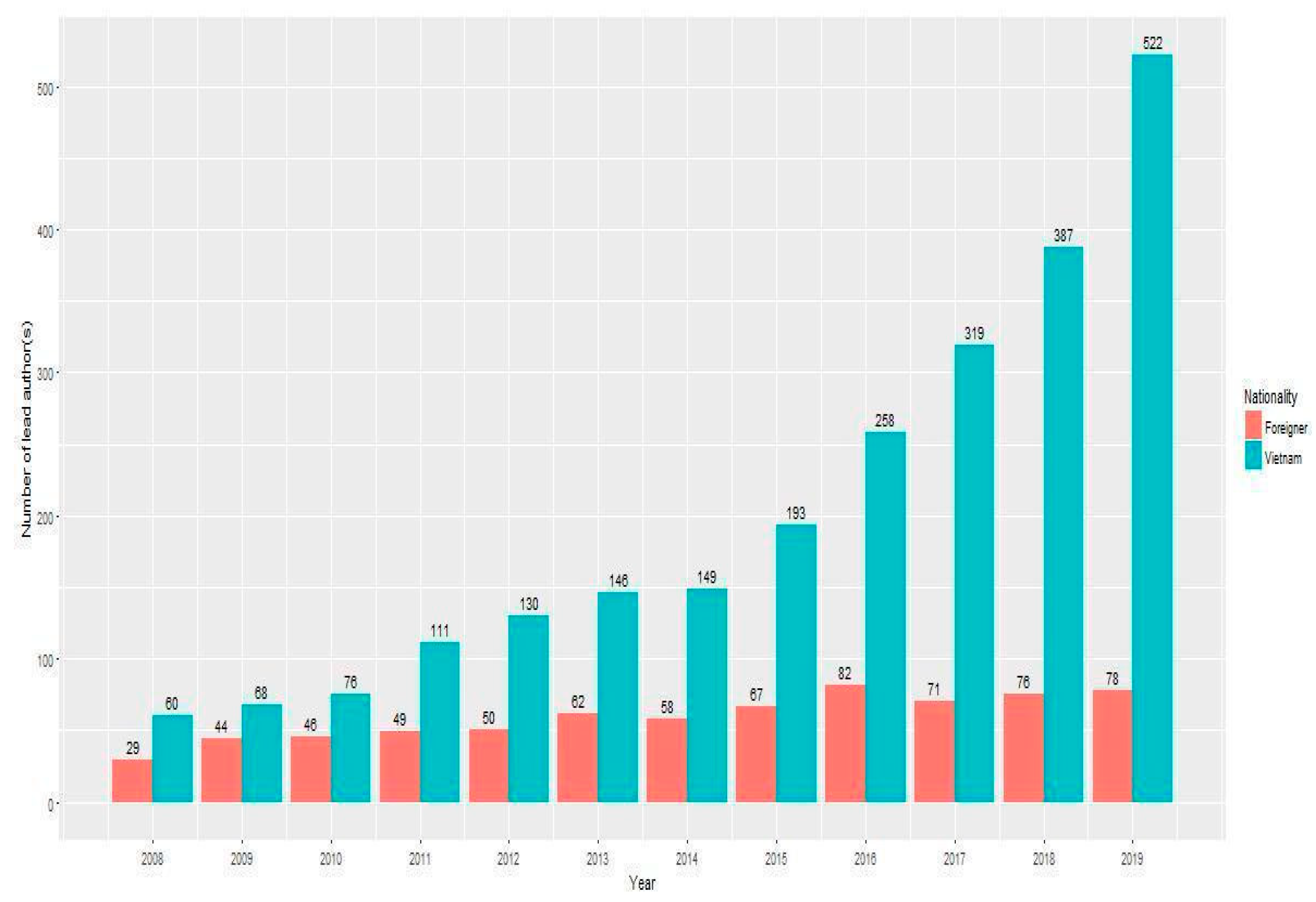
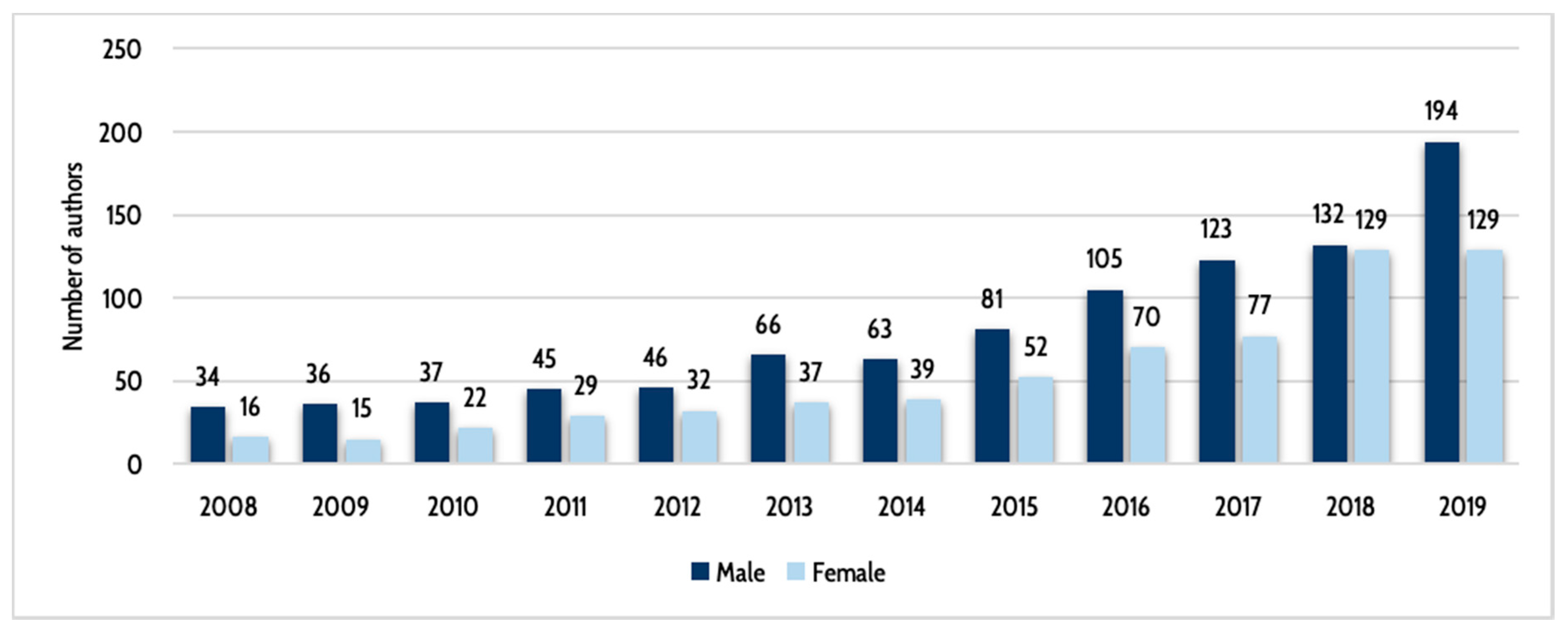

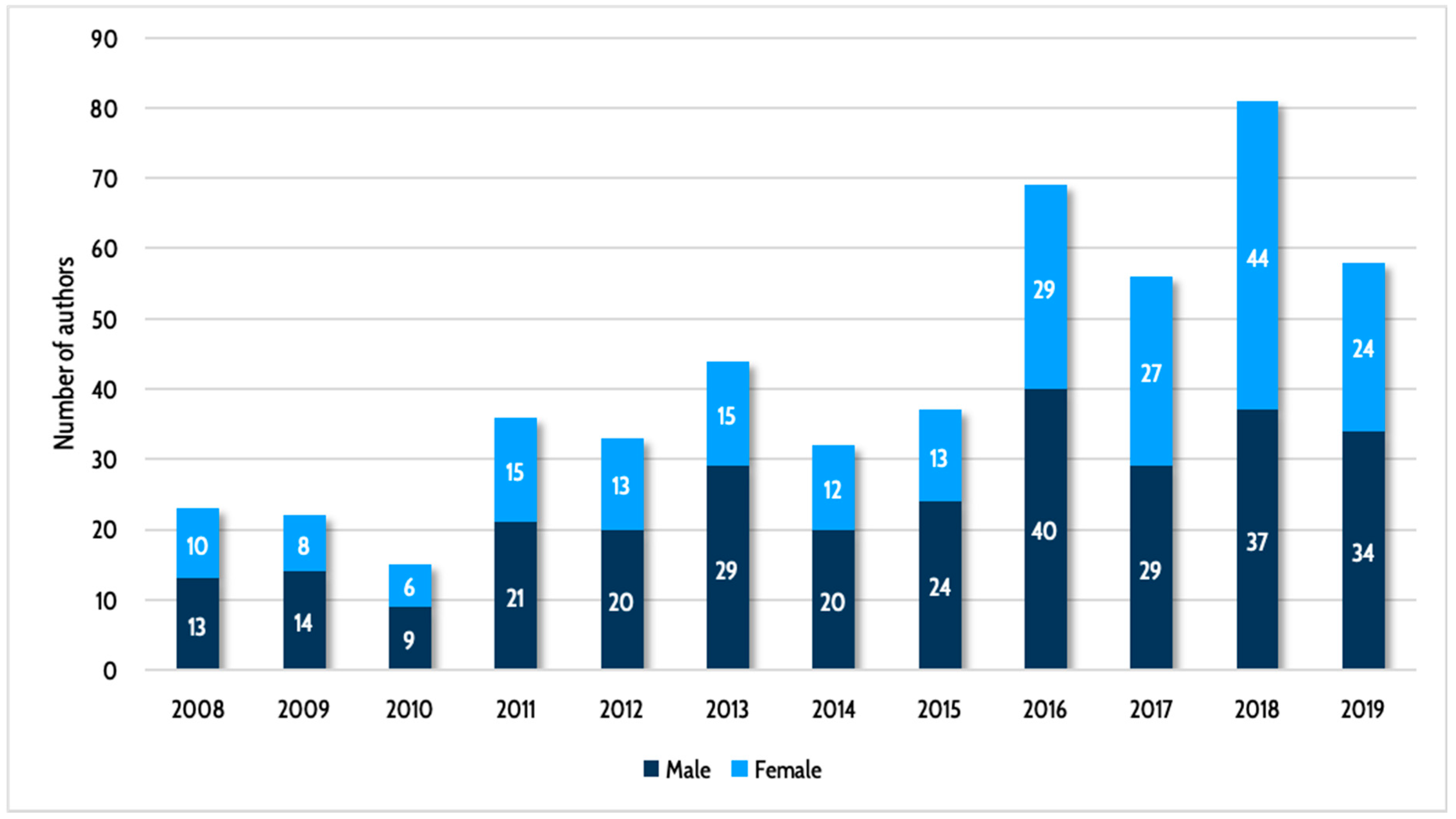

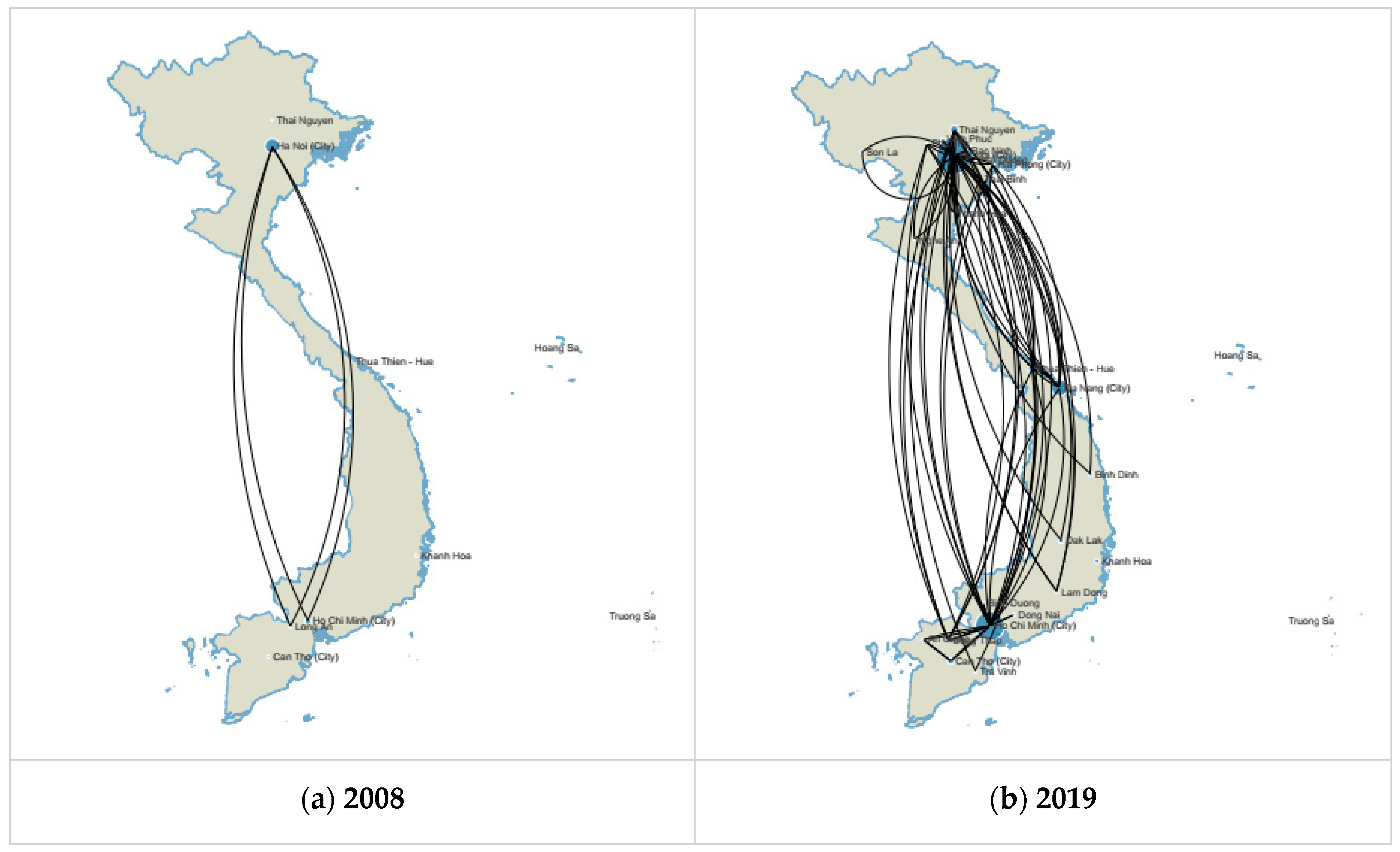

| Field | Number of Articles | Number of Authors |
|---|---|---|
| Economics | 941 | 1350 |
| Education | 484 | 534 |
| Health Care | 451 | 967 |
| Business | 362 | 580 |
| Sociology | 213 | 435 |
| Environment/Sustainability Science | 202 | 538 |
| Management | 154 | 269 |
| Agriculture | 143 | 326 |
| Law | 95 | 79 |
| Tourism | 90 | 121 |
| Political Science | 84 | 115 |
| Psychology | 63 | 189 |
| Media/Journalism | 40 | 53 |
| Linguistics | 39 | 33 |
| International Relations | 38 | 31 |
| Philosophy | 30 | 74 |
| Cultural Studies | 30 | 66 |
| Urban Studies | 27 | 55 |
| Anthropology | 24 | 44 |
| Applied Math | 23 | 39 |
| Scientometrics | 18 | 43 |
| Geography | 18 | 57 |
| Forestry | 15 | 33 |
| Demography | 15 | 32 |
| History | 13 | 21 |
| Art | 11 | 24 |
| Logistics | 10 | 18 |
| Asian Studies | 7 | 16 |
| Archeology | 7 | 36 |
| Literature | 6 | 3 |
| Statistics | 4 | 11 |
| Architecture | 3 | 16 |
| Year | All Authors | Female Authors | Male Authors | ||
|---|---|---|---|---|---|
| No. of Authors | Percentage | No. of Authors | Percentage | ||
| 2008 | 138 | 53 | 38.41% | 85 | 61.59% |
| 2009 | 178 | 58 | 32.58% | 120 | 67.42% |
| 2010 | 182 | 59 | 32.42% | 123 | 67.58% |
| 2011 | 234 | 86 | 36.75% | 148 | 63.25% |
| 2012 | 281 | 102 | 36.30% | 179 | 63.70% |
| 2013 | 325 | 122 | 37.54% | 203 | 62.46% |
| 2014 | 355 | 131 | 36.90% | 224 | 63.10% |
| 2015 | 426 | 163 | 38.26% | 263 | 61.74% |
| 2016 | 554 | 215 | 38.81% | 339 | 61.19% |
| 2017 | 906 | 344 | 37.97% | 562 | 62.03% |
| 2018 | 1081 | 462 | 42.74% | 619 | 57.26% |
| 2019 | 1986 | 773 | 38.92% | 1213 | 61.08% |
| Average | 37.30% | 62.70% | |||
| No | Country | Publication | No | Country | Publication |
|---|---|---|---|---|---|
| 1 | Australia | 855 | 11 | Thailand | 78 |
| 2 | United States | 578 | 12 | South Africa | 76 |
| 3 | Singapore | 208 | 13 | Netherlands | 67 |
| 4 | United Kingdom | 170 | 14 | Sweden | 63 |
| 5 | France | 151 | 15 | South Korea | 49 |
| 6 | Japan | 141 | 16 | Taiwan | 42 |
| 7 | Germany | 106 | 17 | China | 41 |
| 8 | Belgium | 98 | 18 | Denmark | 37 |
| 9 | New Zealand | 97 | 19 | Norway | 35 |
| 10 | Canada | 82 | 20 | Switzerland | 31 |
| Year | Vietnamese Authored Publications | Internationally Collaborated Publications | ||
|---|---|---|---|---|
| No. of Articles | Percentage | No. of Articles | Percentage | |
| 2008 | 33 | 36.67% | 57 | 63.33% |
| 2009 | 35 | 30.17% | 81 | 69.83% |
| 2010 | 33 | 27.05% | 89 | 72.95% |
| 2011 | 67 | 41.88% | 93 | 58.13% |
| 2012 | 73 | 39.89% | 110 | 60.11% |
| 2013 | 81 | 38.57% | 129 | 61.43% |
| 2014 | 73 | 34.76% | 137 | 65.24% |
| 2015 | 92 | 35.38% | 168 | 64.62% |
| 2016 | 157 | 45.24% | 190 | 54.76% |
| 2017 | 190 | 46.34% | 220 | 53.66% |
| 2018 | 217 | 44.83% | 267 | 55.17% |
| 2019 | 378 | 55.83% | 299 | 44.17% |
© 2020 by the authors. Licensee MDPI, Basel, Switzerland. This article is an open access article distributed under the terms and conditions of the Creative Commons Attribution (CC BY) license (http://creativecommons.org/licenses/by/4.0/).
Share and Cite
Ho, M.-T.; Vuong, T.-T.; Pham, T.-H.; Luong, A.-P.; Nguyen, T.-N.; Vuong, Q.-H. The Internal Capability of Vietnam Social Sciences and Humanities: A Perspective from the 2008–2019 Dataset. Publications 2020, 8, 32. https://doi.org/10.3390/publications8020032
Ho M-T, Vuong T-T, Pham T-H, Luong A-P, Nguyen T-N, Vuong Q-H. The Internal Capability of Vietnam Social Sciences and Humanities: A Perspective from the 2008–2019 Dataset. Publications. 2020; 8(2):32. https://doi.org/10.3390/publications8020032
Chicago/Turabian StyleHo, Manh-Toan, Thu-Trang Vuong, Thanh-Hang Pham, Anh-Phuong Luong, Thanh-Nhan Nguyen, and Quan-Hoang Vuong. 2020. "The Internal Capability of Vietnam Social Sciences and Humanities: A Perspective from the 2008–2019 Dataset" Publications 8, no. 2: 32. https://doi.org/10.3390/publications8020032
APA StyleHo, M.-T., Vuong, T.-T., Pham, T.-H., Luong, A.-P., Nguyen, T.-N., & Vuong, Q.-H. (2020). The Internal Capability of Vietnam Social Sciences and Humanities: A Perspective from the 2008–2019 Dataset. Publications, 8(2), 32. https://doi.org/10.3390/publications8020032







